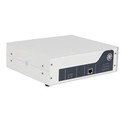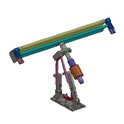Hey there! I'm a supplier of 1000w ultrasonic generators, and today I wanna chat about whether a 1000w ultrasonic generator can be used for ultrasonic forging.
First off, let's understand what ultrasonic forging is. Ultrasonic forging is a cool tech that combines traditional forging with ultrasonic vibration. By applying ultrasonic waves to the forging process, it can improve the quality of the forged parts in many ways. For example, it can refine the grain structure of the metal, reduce the forging force needed, and enhance the surface finish of the final product.
Now, let's dig into the 1000w ultrasonic generator. A 1000w ultrasonic generator can produce a certain amount of ultrasonic energy. The power of an ultrasonic generator is crucial as it determines the intensity of the ultrasonic waves that can be generated. In ultrasonic forging, the intensity of the ultrasonic waves affects how well the metal can be influenced during the forging process.


One of the key factors to consider is the size and type of the metal being forged. If you're dealing with small - sized metal parts or metals that are relatively easy to deform, a 1000w ultrasonic generator might just do the trick. Small parts don't require a huge amount of energy to be affected by the ultrasonic waves. For instance, if you're forging some small precision components made of aluminum or copper alloys, the 1000w ultrasonic generator can provide enough ultrasonic energy to refine the grain structure and improve the mechanical properties of these parts.
However, when it comes to larger metal parts or metals with high strength and toughness, like some high - alloy steels, a 1000w ultrasonic generator may fall short. Larger parts need more energy to ensure that the ultrasonic waves can penetrate deep into the metal and have a significant impact on the forging process. High - strength metals also require more intense ultrasonic waves to overcome their internal resistance and achieve the desired grain refinement and property improvement.
Another aspect is the forging speed. In high - speed forging operations, a 1000w ultrasonic generator may not be able to keep up. The fast - paced forging process demands a continuous and high - intensity supply of ultrasonic energy. If the power is too low, the ultrasonic waves may not be able to fully interact with the metal during the short forging time, resulting in less - than - optimal forging results.
But don't count the 1000w ultrasonic generator out just yet. It has its own advantages. It's relatively more energy - efficient compared to higher - power generators. This means lower operating costs in the long run. Also, it's more compact and easier to install and integrate into existing forging equipment. If you have a small - scale forging operation or you're just starting out in ultrasonic forging, a 1000w ultrasonic generator can be a cost - effective choice to test the waters.
If you find that a 1000w ultrasonic generator isn't quite enough for your needs, we also offer other options. For example, our 3000W Ultrasonic Generator provides a much higher power output, which is suitable for larger - scale and more demanding forging applications. And if you're looking for something with a bit less power, our 500W Ultrasonic Generator can be a good fit for very small - scale or low - energy - requirement forging tasks. Of course, our 1000W Ultrasonic Generator remains a popular choice for many medium - sized and less - demanding forging jobs.
In conclusion, a 1000w ultrasonic generator can be used for ultrasonic forging, but its suitability depends on various factors such as the size and type of the metal, the forging speed, and the scale of the forging operation. If you're thinking about incorporating ultrasonic forging into your business, it's important to carefully evaluate your specific requirements and choose the right power of the ultrasonic generator accordingly.
If you're interested in learning more about our 1000w ultrasonic generators or any of our other products, and you want to discuss your forging needs in detail, feel free to reach out. We're always happy to have a chat and help you find the best solution for your ultrasonic forging operations.
References:
- "Ultrasonic Assisted Manufacturing Technology" - A technical book on the application of ultrasonic technology in manufacturing processes.
- Research papers on ultrasonic forging published in relevant materials science and engineering journals.






